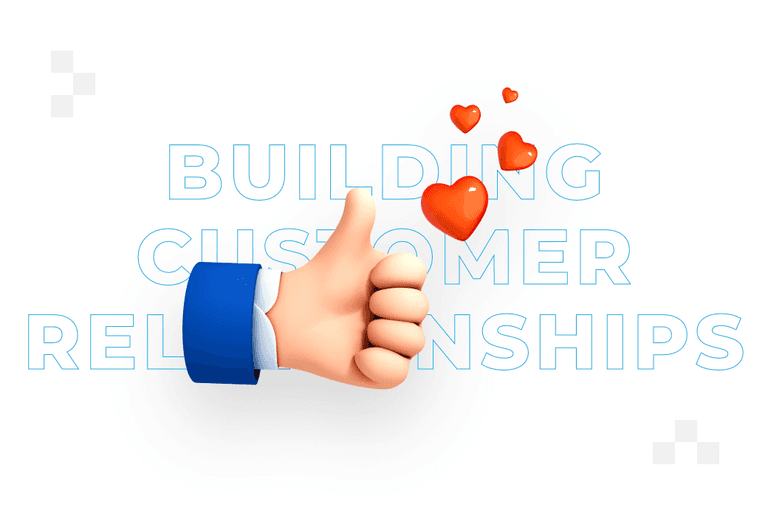
Building customer relationships – good practices

The ability to build relationships is the key to personal and professional fulfilment. How can deep understanding and authentic connections transform every aspect of your personal and business life?
From this article you will learn:
- What is relationship building?
- What goes into relationship building?
- What are the relationships between relationship building and relationship marketing?
- What are good practices in relationship building?
- What can you gain from relationship building?
Building customer relationships – definition
Relationship building is the process of creating and maintaining healthy, supportive and mutually beneficial connections between individuals.
It is a key element in both personal and professional life, as strong relationships can bring benefits such as emotional support, career development assistance, as well as mutual trust and respect.
Relationship building is the process of strengthening bonds through trust, communication and shared experiences.
Definition of relationship building
Relationship building takes time and is often gradual. In a professional context, it can also refer to business networking, which can be valuable for career and business development. In personal life, it can refer to friendships, family relationships or partnerships. Also, maintaining healthy relationships requires work, commitment and flexibility.
Elements of relationship building
Building relationships is a key aspect – especially in the context of business, where creating strong connections with customers, can determine the success of a company.
Building relationships is a complex process with many elements:
- One of the most important is communication – it is the cornerstone of both personal life and business. It requires clarity, openness and honesty and is always aimed at mutual understanding.
- Trust is the foundation of lasting relationships – it is formed through consistency of action, transparency and keeping one’s word.
- An equally important ingredient is reciprocity in relationships – this means a balance between giving and taking; both parties should feel that their contribution is valued.
- Empathy enables you to understand the emotions of others, which is crucial both in personal support and in business understanding of customer needs or team motivations.
- Respecting boundaries ensures that interactions remain healthy and that each person can feel comfortable with their level of involvement in the relationship.
- Spending time together builds experiences that can become the foundation for a deeper bond, whether through personal interactions or through joint business projects and industry meetings.
- Conflicts are inevitable, but the key is how we resolve them – whether constructively in our personal lives or through negotiation and compromise in a professional environment.
- Support manifests itself by helping and providing the resources needed to grow and survive difficult periods.
Each of these components contributes to the strength and depth of the relationship, and their neglect can lead to misunderstandings, conflict or relationship breakdown. In professional life, the same elements translate into networking, client retention and effective teamwork.
Relationship building vs. relationship marketing
Building relationships is not only part of effective interpersonal communication, but also of effective marketing.
Building relationships in business is the foundation for creating the trust, loyalty and respect necessary for effective collaboration and efficient operations. This applies both to relationships within the organisation – between employees and management – and externally – between the company and its customers or partners.
Relationship marketing is a strategy that focuses on creating long-term bonds with customers. It focuses on understanding customer needs and preferences and using this knowledge to personalise communications and offers. It goes beyond single transactions and looks for ways to engage customers deeper and longer.
What both concepts have in common is the belief that business success is rooted in strong relationships. Relationship marketing uses relationships to align activities, offering personalised value that translates into customer loyalty. Companies investing in relationship marketing are constantly looking for feedback, which is also valuable in the context of relationship building – enabling improvement and adjustment of activities. As a result, relationship marketing can be seen as a concretised application of the more general idea of relationship building combined with the company’s strategic objectives and aimed at increasing customer loyalty and retention.
Best practices in relationship building
Building quality relationships requires not only intuition and communication skills, but also the application of proven practices in this area.
There is no one-size-fits-all recipe for effective relationship building; what works in one situation may not be appropriate in another. The key is to adapt these practices to the context and the people with whom you want to build relationships. Here are ways that can be applied:
- Active listening is a key element of relationship building. It means fully engaging in listening, which takes into account both words and nuances not communicated verbally. It requires focus, eye contact or gestures. It is not just waiting for one’s turn, but above all understanding and responding to the interlocutor’s messages, which builds mutual trust and shows respect for the interlocutor’s perspective.
- Empathy in relationships requires empathising with the other person, understanding their emotions and experiences – it’s not just understanding problems, but also responding to them. It allows you to build a deeper bond by showing support and caring. Placing importance on empathy can transform a superficial interaction into a relationship full of trust and closeness.
- Open communication is the foundation of a healthy relationship, where honest expression of thoughts and feelings is key. It enables both parties to clearly understand each other’s intentions and expectations, which prevents misunderstandings. Open sharing also helps to build mutual trust and respect, as both parties feel heard and valued.
- Sharing values is important because shared beliefs and goals create a strong foundation for cooperation and understanding. When people discover that they share similar values, they naturally feel more trust in each other. Acting on these shared values can contribute to a deeper commitment and longevity of the relationship, both in a personal and professional context.
- Consistency in actions and statements is an invaluable asset in building trust. When people experience the same attitude and response in different situations, they begin to have a better understanding of what to expect. Predictability of behaviour creates a safe environment in which others feel comfortable, which in turn allows genuine, deep relationships to flourish.
- Respect is an integral part of healthy relationships, manifested through accepting and valuing other people’s opinions, boundaries and unique personalities. Showing respect promotes mutual understanding and acceptance, enabling people to feel valued and heard. It is also the basis for creating a safe space where everyone can express themselves without fear of criticism or depreciation.
- Reciprocity in relationships refers to a balanced dimension of giving and receiving, which fosters feelings of fairness and equality. When one party supports the other on a regular basis and the other repays the same, a healthy cycle of exchange is created that strengthens the relationship.
- Honesty is the foundation of lasting relationships because it shapes transparency and trustworthiness. When people are honest in their interactions, they eliminate room for understatement or misunderstanding. Honesty creates an atmosphere of openness, where each party feels safe to express their true thoughts and feelings. This is the basis for trust and respect, which are essential in any healthy and functional relationship.
- Resolving conflicts in a constructive manner involves addressing problems openly, rather than avoiding or escalating them. Adopting this attitude requires communication skills, patience and often compromise. Effective conflict management not only resolves current problems, but also strengthens relationships by showing that difficulties and differences of opinion can be overcome together.
- Patience allows relationships to develop over time and avoid hasty judgements. It allows the relationship to mature at its natural pace, providing space for mutual understanding and deep connection. It also shows that you value the relationship enough that you are willing to invest your time and emotions in it, even if things don’t go smoothly.
- Relationship support manifests itself in a willingness to be next to someone both in difficult times and in times of success. Being available when another person is struggling shows solidarity and caring. Equally important is sharing the joy of her achievements, which confirms positive interest and approval of her actions.
- Showing genuine personal interest in the life and wellbeing of others is a meaningful gesture in relationships that indicates deep emotional involvement. Attention to personal details, asking about wellbeing, goals and dreams shows that the relationship goes beyond superficial interactions. This can transform ordinary acquaintanceships into lasting, deep bonds.
- Consistency in regular contact and communication is essential to maintain and strengthen the relationship. It implies not only a constant presence in each other’s lives, but also predictability and a consistent quality of interaction. It builds a rhythm of trust and closeness because people feel that they can rely on you and that you are interested in maintaining the relationship, whatever the circumstances.
- Personalisation in relationship building is about tailoring your approach to each person’s unique needs, preferences and style. It shows that you care about understanding and respecting individuality, which is particularly valued in times of mass communication. Personalising actions, whether through specially selected gifts or individually tailored messages, can significantly increase the sense of importance and value in the eyes of the other person.
- Courtesy is the basis of good manners and plays a significant role in building positive relationships. It is expressing oneself in a pleasant and polite manner, regardless of the circumstances. Being consistently polite creates an atmosphere of friendliness and openness, which promotes better communication and a willingness to cooperate.
- Professionalism is about maintaining appropriate standards of behaviour, especially in a work environment or business dealings. This means that even with more personal ties, we maintain a certain level of formality, focus on goals and objectives and respect for personal and professional boundaries. This prevents misunderstandings and helps to build mutual respect and trust.
- Openness to feedback is important for personal and professional development. Accepting constructive criticism with grace and a willingness to change demonstrates a strong attitude and a desire for continuous improvement. In turn, being open to suggestions from others shows that you value their perspectives and are committed to improving yourself and the relationships you build together.
- Showing gratitude regularly is a key element in building strong and positive relationships. By expressing gratitude for your help and support, you show that you appreciate the time, effort and care of others. It also confirms that their actions matter and are noticed. A gesture of gratitude can take many forms – from a simple ‘thank you’, to a written thank you, to more explicit acts of appreciation.
- Maintaining a positive attitude and a good sense of humour can go a long way to building and maintaining strong relationships. People are naturally drawn to those who can cheer up and bring lightness to everyday interactions. Good humour eases tensions, eases difficulties and fosters memories that cement relationships. Of course, it is important that the humour is appropriate to the situation and perceived by others as non-exclusionary and non-intrusive.
Benefits of building relationships
Building relationships brings many benefits both on a personal and professional level.
Building relationships has many benefits on both a personal and professional level. By creating strong bonds with others, we open the door to better mutual understanding and cooperation. Strong relationships can lead to increased satisfaction in personal life and success in the business world, as people tend to support those they trust and respect. It also contributes to better mental health, as positive interactions with others are associated with reduced stress levels.
In the workplace, effective relationships often lead to better team dynamics, increase productivity and innovation, and strengthen consumer loyalty. In addition, relationship building is an essential networking tool – solid and secure relationships can open up new career and personal development opportunities, as it is from referrals from satisfied customers or partners that new opportunities most often arise.
FAQ
Contact form
Develop your brand
Rate content:
You may be interested in:




